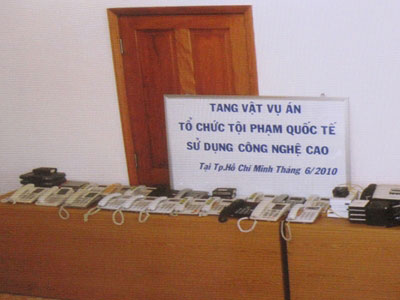Review the 'bad exploits' of bad Vietnamese hackers
Right from the first appearance, Vietnamese "black hat" hackers have shown their "bravery" in the break-in cases, taking account of . account of some "achievements" of Vietnamese hackers in 10 years. come here.

Image for illustrative purposes. (Internet source)
Attack the website of Post and Telecommunications Corporation
After the Post and Telecommunications Corporation applied some account security measures such as limiting phone numbers, providing customers with a list of phone numbers to access their accounts, the hackers redirected to attack Website.
In March 2000, more than 20 websites were attacked by hackers and replaced the homepage content.
SCBank was hacked by hackers 1 million USD
In 2007, SCB's online payment system was hijacked by hackers, attacking and taking away the amount of $ 1 million. During the investigation, the authorities said the hacker had snatched a bank employee.
Hacker snares, after a continuous IN - OUT retrieval on Yahoo and disconnected artificially, hackers can lure employee X to use a different route to chat. The hacker quickly identified the employee using wifi via a public ADSL connection of FPT. Not only that, he also seduced the victim to access a trap (a fake link on the Internet), thereby collecting the operating system and browser version of X.
Hacker became the admin with the highest authority, using a domain account, he started wandering around, filtering out users from the Head of the department. Try again. Eureka . Account of a boss Vice Chairman of the Board has been accepted. As such, hackers log in from SCB's main door (now in the role of the vice president) to carry out a series of online transactions with foreign partners.
Attack, steal credit cards in the UK, Australia
Recently, in December 2010, the Ministry of Public Security said it had broken the hackers of Vietnam hackers to steal information of 100,000 credit cards in the UK, worth 6 million pounds. In particular, it is clear that the subjects Le Dang Khoa, Nguyen Ngoc Lam, Nguyen Ngoc Thanh and Nguyen Dinh Nghi (living in Hanoi and Ho Chi Minh City) are the leaders of the break-ins. These subjects are all very young and good at information technology.

Exhibits of criminal cases using high technology. (Photo of TP).
At the police office, these hackers initially claimed to have "turned" other people's credit accounts into their own and stole money from their accounts. In order to avoid being detected by the account holder, they transfer money into several times with little value. In addition to dealing with domestic authorities, they do not directly accept money but hire others to use their ID cards to carry out procedures to withdraw money at banks. In addition to cash, they also buy many valuable assets such as laptops, expensive items and then mail them.
In addition to the UK incident, the Ministry of Public Security also investigated an identity theft of 1,000 other credit accounts in Australia. Another incident, which is being verified by C50, is that hackers collude with a number of foreign users to use credit accounts to steal tickets online and sell them cheaply.
Vietnamese students steal accounts online
In 2004, international student Nguyen Van Phi Hung was arrested by the Singapore government and forced into 4 of 11 crimes of illegal use of PC.
With an online game with a built-in Trojan program, hidden software that records keystrokes, Phi Hung captured your personal information and used it to steal $ 638 from their bank account.
In November 2010, an international student in Australia nicknamed PK Cen attacked the bank's online payment system, crawled into a server hosting databases and used this information to buy goods on eBay. This object was arrested by Australian Police.
After several times discovered some security holes, the nickname PK Cen has gradually been noticed by hackers in Australia. PK Cen to database server of Bank of Australia. Understanding important information, PK Cen uses hacked credit accounts to make purchases on eBay, a large online auction site.
Facebook was attacked by Vietnamese hackers
In June 2009, when accessing the homepage of Facebook.com and Facebook.vn, a small message line with rude and indecent words smeared BKAV and the director of cyber security center Bkis Nguyen Tu Quang appeared under the registration frame. Some information initially suggested that Facebook was faulty and Vietnamese hackers took advantage of this error to bring the above content to the Facebook homepage.
You should read it
- ★ Discovered a group of Vietnamese hackers specializing in stealing credit cards for the past 8 years
- ★ 7 steps to use a secure credit card online
- ★ 6 things to know about cash-back credit cards
- ★ Credit scores: Everything you need to know
- ★ Filipino hackers attack the Vietnamese web, retaliating that many users' Facebook accounts are 'hacked' by Vietnamese people